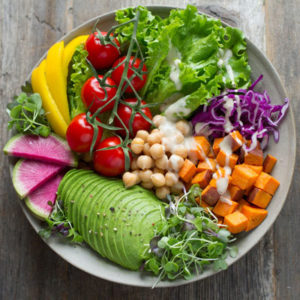 Remember when your mom used to tell you to eat your vegetables? What a smart lady! It turns out (shocker) that eating a diet of nutrition-rich foods like fruits and vegetables is good for your health.
Remember when your mom used to tell you to eat your vegetables? What a smart lady! It turns out (shocker) that eating a diet of nutrition-rich foods like fruits and vegetables is good for your health.
Thanks mom!
Now that’s true for everyone, of course, but since we’re a company that focuses on the treatment of neurodegenerative diseases like Parkinson’s, we wanted to take a closer look at the effects of good nutrition on people with Parkinson’s disease. And thankfully for us there was a lot of great information out there. The effects of a good diet on Parkinson’s disease is a subject that has been covered extensively by researchers, scientists and advocacy groups.
We collected some of our favorite articles, and we also asked people with Parkinson’s and their caregivers to weigh in on the subject.
“My mom with Parkinson’s seems more positive and motivated when she feels good from eating well,” said Brenda Carpenter, who is one of her mother’s primary caregivers.
Diana Gainer, who cares for her husband with Parkinson’s, said a good diet—even though it can be challenging to manage—helps a whole lot. “Eating a balanced diet is good for general health, so it’s definitely [good] for people with Parkinson’s.”
But what exactly do we mean when we say “good” diet and nutrition? After all, there are LOTS of different opinions out there when it comes to nutrition.
We like this summary from the Michael J. Fox Foundation: “a balanced diet full of fruits and vegetables promotes health and well-being for everyone.”
The summary continues, “one part of a healthy diet is eating foods with antioxidants. These ‘good for you’ molecules help protect cells from stresses such as air pollution, cigarette smoke and even the process of converting food to energy. Antioxidants are found in fruits, vegetables, grains, nuts, dark chocolate and some beverages, such as red wine, coffee and tea.”
Eating these sorts of good foods can help ease many symptoms of Parkinson’s disease, both motor and non-motor. Here are some specific symptoms that could be managed with good diet and nutrition:
Constipation: Fruits, vegetables, beans and whole grains are high in fiber, which help regulate the digestive system and keep things moving.
Dehydration: People with Parkinson’s tend to be dehydrated more than most (sometimes due to medication). Dehydration can lead to issues with balance, confusion, weakness and even kidney problems. Drinking lots of water and eating a plant-based diet will ensure the body is properly hydrated.
Inflammation: Another common symptom of Parkinson’s disease is excessive inflammation, leading to pain and other kinds of discomfort. Fresh fruits and vegetables, whole grains and lean proteins are known to be anti-inflammatory.
“While there is no prescription for a PD-specific diet,” says the Parkinson’s Foundation, “to maintain overall good health most people living with Parkinson’s disease should eat a variety of whole grains, vegetables, fruits, milk and dairy products, and protein-rich foods such as meat and beans. Also consider including nuts, olive oil, fish and eggs to your diet, for their beneficial fats.”
Interested in learning more about the effects of good diet and nutrition on Parkinson’s disease? Here are some more resources:
Diet & Nutrition – The Michael J. Fox Foundation
Fighting Parkinson’s Disease with Exercise and Diet – Johns Hopkins Medicine
The Best Diet for Parkinson’s Disease – The Cleveland Clinic
Parkinson’s Disease – Food for the Brain Foundation
Eating with Parkinson’s – Parkinson’s Association of San Diego
Diet & Nutrition – Parkinson’s Foundation
And to learn more about how PhotoPharmics is using light therapy to treat the motor and non-motor symptoms of Parkinson’s disease, be sure to sign up for our email list at PhotoPharmics.com/Connect.





